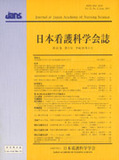Japanese
English
- 販売していません
- Abstract 文献概要
- 参考文献 Reference
- サイト内被引用 Cited by
要旨
目的:職務における機会と権力が業績に影響を及ぼすというKanterの職務エンパワメント理論に基づき作成された看護職の職務エンパワメント尺度の日本語版を作成し,有用性を検討することを目的とした.
方法:作者の許諾を得た上で調査票の翻訳・逆翻訳を行い,5病院の看護職を対象として質問紙調査を実施した.
結果:1,145名(回答率76%)から回答を得た.下位尺度の信頼性係数(α)は,機会(0.81),支援(0.90),資源(0.75),情報(0.86)であった.経験3年以内の者は,「支援」の得点が高く,経験年数が長い方が「情報」の得点が高くなっていた.カナダの看護師に比べ,「機会」と「資源」の得点が低く,「支援」の得点が高い傾向がみられた.
結論:日本語版看護職の職務エンパワメントを作成した.一定の信頼性があり,海外の看護職との比較などに用いることができると考える.
Abstract
Kanter argued that employees come to express their situations through their behaviors, and opportunity and power may explain a large number of discrete individual responses to organizations. Based on Kanter's theory, Laschinger et al. developed the Nursing Work Empowerment Scale, which includes the Conditions of Work Effectiveness Questionnaire(CWEQ) I.
Objectives:The purpose of this study is to develop a Japanese version of the Nursing Work Empowerment Scale and to test its utility.
Methods:After obtaining permission, we developed the Japanese version of the Nursing Work Empowerment Scale by translating and back-translating the CWEQ I. We invited nursing staff from five hospitals(N=1,511) to submit answers to the questionnaire.
Results:We received responses from a total of 1,145 nursing staff(response rate: 76%). The Chronbach α values for Opportunity, Support, Resource, and Information were 0.81, 0.90, 0.75, and 0.86, respectively. Nursing staff who had worked less than three years obtained low Support scores, and those who had a long tenure obtained higher Information scores. Japanese nursing staff had lower Opportunity and Resource scores and higher Support scores than Canadian nurses.
Conclusions:The Japanese version of Nurses Work Empowerment Scale is sufficiently valid, and work empowerment in Japanese hospitals is comparable to that of North American hospitals, according to this scale.
Copyright © 2011, Japan Academy of Nursing Science. All rights reserved.


